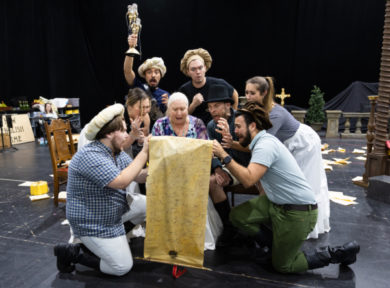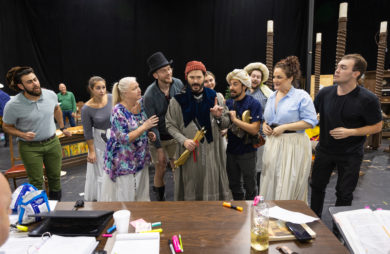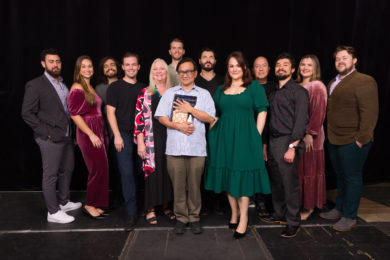Doubles match: Florida Grand Opera to pair a Puccini classic with a sequel

YOU’RE OUT OF THE WILL: The Donati family gets unwelcome news in cast rehearsals for FGO’s joint production of “Gianni Schicchi” and “Buoso’s Ghost.” Photo: Eric Joannes
Operatic sequels are rarities. In many operas, the protagonist is dead at the final curtain, making a continuation of the story unlikely. To be sure, there are exceptions: Pierre Beaumarchais’ three Figaro plays spawned Rossini’s Barber of Seville, Mozart’s The Marriage of Figaro and John Corigliano’s The Ghosts of Versailles.
Handel’s Agrippina, presented last season by Florida Grand Opera, is a prequel to Monteverdi’s Coronation of Poppaea. And then there’s Wagner’s four-opera Ring cycle.
Into this comparatively wide-open artistic space, where a handful of operatic giants dominate, steps Florida Grand Opera. Beginning on Saturday night at the Arsht Center in Miami, FGO is presenting a double bill of Puccini’s Gianni Schicchi, from 1918, and Buoso’s Ghost, a contemporary sequel by composer Michael Ching.
The two one-act operas — written about 80 years apart — will be performed back to back, with a break in between. At an estimated 2 hours and 10 minutes, intermission included, it’s a dual production that asks less of an audience, endurance-wise, than many single operas. But it’s a novel pairing, Ching’s sequel with Puccini’s comedic masterpiece, and a field test of Ching’s own ideas about opera in the 21st Century.
Ching, who will conduct the performances, said in an interview that audiences are open and eager to hear new works, and will embrace them when they are “accessible, singable and entertaining in a welcoming and fun way.”
He and his collaborators in the double bill also told South Florida Classical Review that they have a winning central character in both operas: the crafty country lawyer Gianni Schicchi, who turns the tables on his snobby, citified clients with outrageous results.
Ching’s sequel premiered at Opera Memphis in 1997 and has been produced by numerous regional and collegiate opera companies. Its arrival here with Gianni Schicchi is also something of a homecoming: Ching worked at FGO in the 1980s as an assistant to the company’s then-director, Willie Anthony Waters, when it was called Greater Miami Opera.
Ching recalled that, back in the 1990s, during a break in joint singers’ auditions with other regional companies in Chicago, he and Waters “were shooting the breeze about what would become of some operatic characters in the future.” From there, the germ of the idea for Buoso’s Ghost was born.

PLANS, PLANS: Schicchi (Franco Pomponi, center) tells the Donatis how to fix things as his daughter Lauretta (Page Michels, second from right) looks on. Photo: Eric Joannes
Gianni Schicchi, for its part, is not exactly a sequel but it is an entry in a loosely thematic series: the last — and funniest — of three one-act operas comprising Puccini’s Il Trittico, after Il Tabarro and Suor Angelica. From the trilogy’s debut at New York’s Metropolitan Opera, the familial comic closer was the biggest hit with critics and audiences. It is often performed apart from its two siblings — an arrangement Puccini disliked but could hardly stop.
A family matter
In Puccini’s original, a medieval Florentine household of some means, the Donatis, discover that their dearly departed paterfamilias, Buoso, has left all his money and property to the church. Schicchi, a lawyer of peasant stock, approaches the stunned survivors with a scheme to impersonate a dying Buoso and dictate a new will.
Despite their disdain toward Schicchi, the relatives are enthusiastic. When a notary arrives, Schicchi, posing as Buoso, declares the old will null and void. And after first leaving some minor holdings to the relatives, he assigns the major assets — the house, the mills, and a mule — to himself and chases the relatives from what is now his estate.
Schicchi’s daughter, Lauretta, who is in love with a Donati clan relative, Rinuccio, can now marry thanks to her newly wealthy father. End of story!
In Ching’s sequel (spoiler alert), Schicchi discovers that Buoso’s death was not from natural causes, while the thwarted Donati heirs plot to take revenge and reclaim the estate by accusing Schicchi of the murder. He outsmarts them again by impersonating Buoso’s ghost.
A knight in tarnished armor
Gianni Schicchi de’ Cavalcanti was reportedly an actual knight with con-man tendencies in 13th Century Italy, although little is verifiably known about him. He first appears as a fictionalized character in the “Inferno” section of Dante Alighieri’s epic poem, The Divine Comedy. Dante depicts him in the eighth circle of hell, reserved for fraudsters — a dim view of the man clearly influenced by Dante’s having married an aristocrat, Gemma Donati.
Along with Puccini, Ching and baritone Franco Pomponi — who sings the protagonist in the FGO staging — have a different perspective on Schicchi. Ching said he sees him as “a smart, upcoming guy who gets things done,” and as “a comic hero.”
Pomponi described Schicchi as a crafty practical joker — “sharper than anybody else in the room, a universal figure and a big, warm-hearted guy.” It’s his first time in the title role. Pomponi has sung the roles of Marco and Dr. Spinellocio in previous Gianni Schicchi productions, and he once shared the stage with the famed Italian baritone Rolando Panerai as Schicchi.
Calling it one of his dream roles, he said, “I am having a ball” playing the part. He said that alongside Verdi’s Falstaff, he sees Gianni Schicchi as the true comedia dell’arte baritone showcase. He described Buoso’s Ghost as a gear-shift into a more dramatic and theatrical context, and he wants to build on the vocal-theatrical momentum of the Schicchi double bill with his future role choices — one of which, Ezio in Verdi’s Attila, he will be singing in Chicago next summer.

CAST AND CREATOR: Composer and conductor Michael Ching (center) with (L-R) Eleomar Cuello (Marco), Erin Alford (La Ciesca), José Vasquez (Guccio, Friar 2), Charles Calotta (Rinuccio), Robynne Redmon (Zita), Anthony Reed (Simone), Franco Pomponi (Gianni Schicchi), Page Michels (Lauretta), Ismael Gonzalez (Dr. Spinellocio/Pinellino), Phillip Lopez (Betto), Ashley Shalna (Nella), Joseph McBrayer (Gherardo). Photo: Eric Joannes
The double bill’s director, Mo Zhou, said that Schicchi is a complex, cunning and layered protagonist, describing him variously as “a self made man, “a newcomer” and an “underdog” who has great love and devotion to his daughter and is willing to struggle and toil for her happiness.
Lauretta is the rare Puccini heroine to not meet a tragic end. Soprano Page Michels, an FGO studio artist who sings Lauretta, believes the role’s popular aria, “O mio babbino caro,” is more than just a pretty Puccini tune: It’s where she said “Lauretta is developing a sense of manipulation and power over her dad.”
When Schicchi is about to stalk off, having just been insulted by the Donatis, it is Lauretta who convinces him to look at the will, which sets his plot in motion, Michels noted. She said she also has a “beautiful, high, soaring duet with Rinucchio” (played in this production by FGO studio artist Charles Calotta) and, in Lauretta, a musically complex but still highly melodic role that suits her voice — which she considers weightier and darker in color than that of many sopranos who have sung the part before her.
Visions of opera’s future
Ching, the composer, said that working in a comedic vein gave him an opportunity to play with different musical styles as he wrote Buoso’s Ghost and sought to create a unique sonic world for it. He score is “eclectic and very tonal,” he said, and listeners will also have fun picking out the easter eggs — the various musical quotations that run through the score, from melodies in the Puccini work to Shostakovich to Broadway.
He is optimistic about the future of opera as a creative art form, pointing out that his 2013 opera Speed Dating Tonight has already received 120 performances since its premiere. (One of these was a 2020 production staged entirely as a Zoom video call — as one does during a pandemic.) Ching loves ensemble opera where as many as a dozen characters may be involved. Speed Dating Tonight and Buoiso’s Ghost definitely belong to that genre.
Zhou made the leap to directing with FGO help — general director Susan Danis recruited her from a staff job at Lyric Opera to direct Mozart’s Don Giovanni in 2019 — and she, too, sees opera’s future in a greater focus on new works, the better “to revitalize, rebrand and preserve the art and move forward,” she said.
She noted that the contemporary works are selling out this season at The Met, while the venerable New York opera house has struggled to fill seats for Verdi, Puccini and Mozart. Zhou added that smaller scale work in more intimate settings may be the path for the future and a source of new opportunities for composers like Ching.
(The pandemic has spurred movement in this direction: In 2021, with its traditional regular season canceled, FGO rebounded with a quartet of one-act operas at the 330-seat Miami Theater Center in Miami Shores for socially distanced audiences. Danis has said she would like to keep bringing adventurous repertoire there.)
For the moment, however, Zhou’s attention is on a full-scale dual production that will occupy venues seating 2,400 people (Arsht) and 2,700 people (The Broward Center for the Performing Arts Au-Rene Theater).
Zhou said she finds finds comedy to be the hardest form of opera to stage, given the need for an ensemble that understands timing and has a collective sense of humor, not just a reportoire of funny theatrical or musical tricks. For an opera to succeed as comedy, she said, every part must be taken seriously.
Florida Grand Opera presents Gianni Schicchi and Buoso’s Ghost 7 p.m. Saturday January 28, 2 p.m. Sunday January 29, and 8 p.m. Tuesday January 31 at the Arsht Center in Miami; and 7:30 p.m. Thursday and Saturday, February 9 and 11, at the Broward Center in Fort Lauderdale. fgo.org
Posted in Articles
Leave a Comment
Tue Jan 24, 2023
at 9:49 am
No Comments